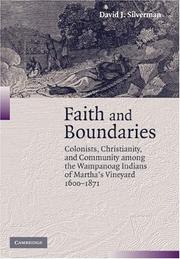| Listing 1 - 2 of 2 |
Sort by
|
Book
ISBN: 9781469648415 1469648415 9781469648422 1469648423 9781469648392 1469648393 9781469648408 1469648407 9798890855534 Year: 2019 Publisher: Chapel Hill
Abstract | Keywords | Export | Availability | Bookmark
 Loading...
Loading...Choose an application
- Reference Manager
- EndNote
- RefWorks (Direct export to RefWorks)
"This book is situated within the terrain of intense debate over the placement and displacement of monuments to difficult histories. Installed in Plymouth in 1921 to commemorate the Tercentenary of the landing of the Pilgrims, Cyrus Dallin's statue Massasoit was intended to memorialize the Pokanoket Massasoit (leader) Ousamequin as a welcoming diplomat and participant in the mythical first Thanksgiving. But Massasoit did not remain only in Plymouth. Lisa Blee and Jean O'Brien track the physical and narrative mobility of Massasoit through its inception and its movement to numerous locations in the US to illuminate how Massasoit's attachment to national origins did and did not move with the installations. The historical memory surrounding Massasoit suggests both the rich potential of Indigenous public historians to intervene in sanitized national narratives of origins, and the ways in which this history is commodified. Can Massasoit prompt viewers to reckon with ... the structural violence of settler colonialism in commemorative landscapes, or does it further entrench celebratory narratives of national origins?"--
Collective memory --- Monuments --- Wampanoag Indians --- Massasoit Indians --- Pokanoket Indians --- Algonquian Indians --- Indians of North America --- Historical monuments --- Architecture --- Sculpture --- Historic sites --- Memorials --- Public sculpture --- Statues --- Collective remembrance --- Common memory --- Cultural memory --- Emblematic memory --- Historical memory --- National memory --- Public memory --- Social memory --- Memory --- Social psychology --- Group identity --- National characteristics --- Political aspects --- Social aspects --- History. --- Massasoit,

ISBN: 0521842808 9780521842808 0521706955 1139239287 0511806531 9780511806537 9780521706957 Year: 2005 Publisher: Cambridge Cambridge University Press
Abstract | Keywords | Export | Availability | Bookmark
 Loading...
Loading...Choose an application
- Reference Manager
- EndNote
- RefWorks (Direct export to RefWorks)
It was indeed possible for Indians and Europeans to live peacefully in early America and for Indians to survive as distinct communities. Faith and Boundaries uses the story of Martha's Vineyard Wampanoags to examine how. On an island marked by centralized English authority, missionary commitment, and an Indian majority, the Wampanoags' adaptation to English culture, especially Christianity, checked violence while safeguarding their land, community, and ironically, even customs. Yet the colonists' exploitation of Indian land and labor exposed the limits of Christian fellowship and thus hardened racial division. The Wampanoags learned about race through this rising bar of civilization - every time they met demands to reform, colonists moved the bar higher until it rested on biological difference. Under the right circumstances, like those on Martha's Vineyard, religion could bridge wide difference between the peoples of early America, but its transcendent power was limited by the divisiveness of race.
Christianity and culture --- Wampanoag Indians --- Government relations. --- History. --- Religion. --- Martha's Vineyard (Mass.) --- Social life and customs. --- Arts and Humanities --- History --- Contextualization (Christian theology) --- Culture and Christianity --- Inculturation (Christian theology) --- Indigenization (Christian theology) --- Culture --- Massasoit Indians --- Pokanoket Indians --- Algonquian Indians --- Indians of North America --- Capawick (Mass.) --- Capawock (Mass.) --- Capawok (Mass.) --- Capowack (Mass.) --- Ile de Martha's Vineyard (Mass.) --- Island Louisa (Mass.) --- Island Luisa (Mass.) --- Isle of Capowack (Mass.) --- Isles of Capawok (Mass.) --- Kapawok (Mass.) --- La Soupconneuse (Mass.) --- L'ile de Martha's Vineyard (Mass.) --- Louisa, Island (Mass.) --- Luisa, Island (Mass.) --- Maertens Wyngart (Mass.) --- Maertens Wyngert (Mass.) --- Martc Vineyard (Mass.) --- Marthaes Vineyard (Mass. : Martha's Vineyard) --- Martin Wyngaards Island (Mass.) --- Martin's Vineyard (Mass.) --- Martyn's Vineyard (Mass.) --- No-epe (Mass.) --- Noepe (Mass.) --- Nope (Mass.) --- Soupconneuse, La (Mass.) --- Straumey (Mass.) --- Texel (Mass.) --- Verazzano (Mass.)
| Listing 1 - 2 of 2 |
Sort by
|

 Search
Search Feedback
Feedback About UniCat
About UniCat  Help
Help News
News